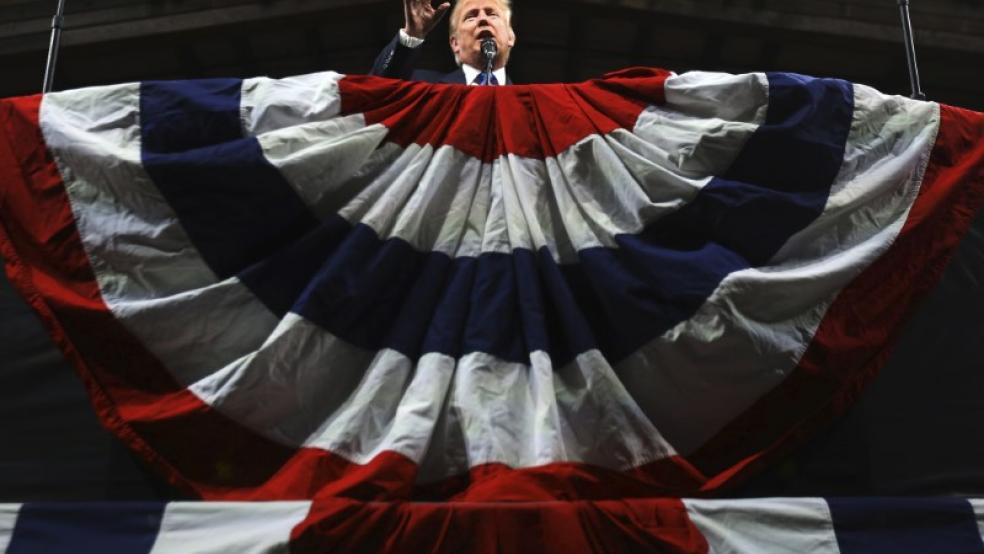Last night’s Republican presidential primary in New Hampshire was many things, but a clarifying moment was not among them. The victor proved that a candidate who eschewed the traditional diner-to-diner-trudge in favor of a series of fly-by rallies could win the Granite State. At the same time, the runner-up proved that intensive one-on-one engagement with voters in the state still has the ability to resurrect a moribund campaign.
By early Wednesday morning, with 92 percent of precincts reporting results, Republicans who had been hoping for a winnowing of the still-bloated field of candidates, came away with much less clarity than they had hoped for.
Related: Did He Really Say That? Trump Hits a New Low in New Hampshire
Eight days removed from an embarrassing second place finish in the Iowa caucuses, billionaire Donald Trump came roaring back in New Hampshire on Tuesday night, outperforming his polls to take first place in the Granite State’s Republican presidential primary. Trump more than doubled the vote total of his nearest rival, Ohio Gov. John Kasich, taking 35 percent of the divided Republican field to Kasich’s 16 percent.
“Oh, wow. Wow,” Trump began his victory speech, before repeating his tagline, “We’re going to make America great again.”
Kasich also over-performed on Tuesday. His 16 percent finish topped the average of 13.5 percent in the Real Clear Politics polling average that he carried into the day’s voting, and which had him in third place among Republicans. The Ohioan, a second-term governor and a long-time member of Congress, had essentially declared that a strong performance in New Hampshire was essential to his remaining in the race.
In a somewhat awkward post-primary speech, he said, “There’s magic in the air with this campaign,” and he promised to “reshine America.”
Related: Why the Working Class Is Choosing Trump and Sanders
Below the two top vote-getters, things got crowded, which has been the story of the GOP primary so far this cycle. While Trump’s victory in New Hampshire was all but a foregone conclusion among poll-watchers, the first primary election of the 2016 cycle was a mixed bag for other candidates.
Iowa victor Sen. Ted Cruz of Texas matched his pre-election polls with 12 percent of the vote to come in third. Former Florida governor Jeb Bush also met pollsters’ expectations, coming in fourth at 11 percent.
Coming off a strong third-place finish in Iowa last week, many believed Florida Sen. Marco Rubio had the chance to “clear the field” of other establishment Republicans, but he fared poorly, winning only 11 percent – along with Bush, that gave him barely enough to qualify for any delegates to the Republican convention this summer.
Cruz will likely shrug off his 12 percent in New Hampshire and move on to the next primary, in South Carolina, far more fertile ground for a strong religious conservative. Bush, who has struggled to remain relevant in the campaign, can easily spin his 11 percent showing into a minor victory, if only because his campaign has been written off more times than anyone can remember.
After that, though, things get tricky. Rubio looked like an also-ran on Tuesday – something he and others blamed on a Saturday night GOP debate in which New Jersey Governor Chris Christie mercilessly attacked him for being callow and robotic.
Related: Michael Bloomberg – This Campaign Is an Insult to Voters
After thanking his supporters for their efforts, Rubio turned serious. “I’m disappointed with tonight,” he began. “I want you to understand something. Our disappointment tonight is not on you. It’s on me.”
To rising objections from his supporters, he repeated, “It’s on me. I did not do well on Saturday night. So listen to this: That will never happen again.”
If Rubio could take ay pleasure in the night’s result, it was likely in the fact that Christie, in his effort to bring Rubio down, did himself little good. With only 7 percent of the vote, the New Jersey governor will take no delegates from New Hampshire, and will likely be forced from the race.
Other GOP candidates also fared poorly. Former Hewlett-Packard CEO Carly Fiorina managed only 4 percent of the vote, and retired neurosurgeon Ben Carson took only 2 percent. While either could stay in the race for some time, a few more showings like Tuesday’s will quickly make the futility apparent.





